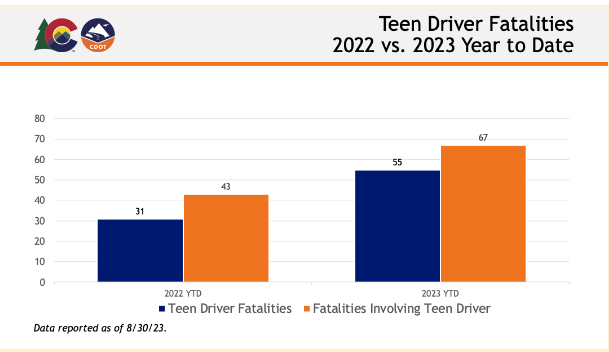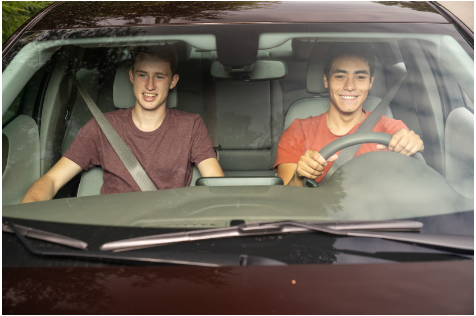Five life saving tips for new teen drivers heading back to school
News Release
Statewide — As the school year kicks off and a new batch of eager teens hit the roads with their new driver's licenses, it's essential to remember that such freedom comes with increased responsibility. Teen driving fatality data in the state shows an alarming trend. This year in Colorado, 55 teen drivers have died on the road, up 77% from this time last year. Also concerning is the number of fatal crashes that involve teen drivers. So far this year 67 roadway fatalities have involved a teen driver, up 56% from this time last year.

Colorado’s Graduated Drivers Licensing (GDL) laws are specifically designed to help teenagers gain important driving skills gradually while minimizing risks. Since the passage of GDL laws, overall fatal crashes declined significantly for young drivers ages 16-17. Over the past 20 years, GDL laws have contributed to a near 50% reduction in traffic fatalities involving young drivers.
To ensure the safety of these new road users, CDOT offers the following five vital tips every teen driver should keep in mind:
1. Passengers Restrictions
Teens with a new license must follow specific passenger restrictions during their first year on the road:
- No passengers under 21 for the first six months unless a parent or other licensed adult driver over 21 is in the vehicle
- For the following six months, only one passenger under 21
- Exceptions are allowed for medical emergencies
2. Always Buckle Up
Both teen drivers and passengers are legally required to wear seat belts at all times. This simple act can greatly reduce the risk of injury in the event of a crash. Unfortunately, seat belt use is lowest among teen drivers. According to the National Highway Traffic Safety Administration (NHTSA), the majority of teenagers involved in fatal crashes are unbuckled — in 2019, 45% of teen drivers who died were unbuckled. Even more troubling, when a teen driver involved in a fatal crash was unbuckled, nine out of 10 of the passengers who died were also not wearing their seat belts.
3. Stay Focused: No Cell Phone Use or Texting While Driving
Teens under 18 are prohibited from using a cell phone while driving and risk losing their license and getting fined for doing so.
4. Stick to Curfew Times
During the first year of driving, teens must adhere to a curfew — refraining from driving between midnight and 5 a.m., unless accompanied by an instructor, parent or legal guardian. Exceptions include driving to/from school or work, medical emergencies and emancipated minors. Curfew laws may vary by location, so it's important to confirm with local authorities.
5. Never Drive Under the Influence of Alcohol or Drugs
New teen drivers should always steer clear of alcohol and drugs when behind the wheel. The maximum Blood Alcohol Concentration allowed is just 0.02%. A person under 21 who drives impaired in Colorado faces either an Underage Drinking and Driving (UDD) charge, a Driving While Ability Impaired (DWAI) charge or a Driving Under the Influence (DUI) charge. In 2022, 1 out of every 3 traffic deaths on Colorado roads involved an impaired driver.

"By embracing these guidelines, young drivers can confidently embark on their driving journey while staying safe and responsible," said CDOT’s Office of Transportation Safety Director Darrell Lingk. "It's essential for teens and their parents to work together to establish a solid foundation for safe driving habits."
Parents and teenagers are encouraged to set ground rules and establish an agreed-upon driving contract, including no cell phone usage, no passengers, no speeding, no alcohol or drugs and always buckling up. This proactive approach could prove to be life saving for teens as they navigate the roads ahead. For more information on a teen/parent driving contract, click here.
